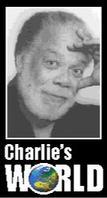By Charles Hyatt, Contributor 
THE ACTOR will hardly admit that he is out of work. The period between his last production and the next is referred to as 'resting'. That term gives the impression that the period of unemployment is self imposed.
Now in my early days in England, as an actor, I could not afford many of those periods and I was a little too proud to stand in line to collect the dole.
The policy of the Government at that time was to assure every employed or employable person the ability to contribute towards a pension. In the case of the temporarily out of work, based on his or her domestic status, an amount of money is doled out weekly from which stamps are expected to be bought and entered into a 'code book'. This code book one has to submit to one's employer for them to stamp it.
It was no big thing to turn up at the Labour Office and see other out of work sorry, 'resting' actors arrive in their Jaguars, Bentleys and Rolls to collect their dole.
I couldn't deal with it, though. Too proud and too facety. I was not going to leave my good, good yard and go ask for dole up there.
The system in England then provided employment for temporary workers and so you would find 'resting' actors and students working as temps. There were agencies that specialised in placing temps. I registered with a few of these so that as soon as I was out of work I would be on call.
Now back in Jamaica as a young boy of 16, I had gone to work in the office of E.A. Issa and brothers on Harbour Street, straight out of school.
There I met Mrs. Aquart, the most efficient telephonist I have ever known. I say this because she had two bosses who were very demanding. They had offices that were separated by only a wooden wall yet they communicated only by telephone.
One would take up his extension and ask to be connected to the other and then hang up. When the other brother was summoned and told that his brother wanted to speak to him he would say 'Put him on' and then hang up. Mrs. Aquart devised a system whereby she would ring both their extensions simultaneously and when they both picked up and said 'Hello" she would announce them one to the other. To watch her operate the PBX was a delight for me.
To be able to operate the switchboard as well as she did was an ambition that was eventually realised.
Several years later I took that skill with me to England. As a temp telephonist I worked with Barclays Bank, Shell Company and one or two small British companies. Barclays offered me a permanent position.
One day I read in the newspaper that the GPO (General Post Office) was looking for people to be trained as international telephonists. I applied for the fun of it and was accepted. I went on the two weeks training course and finished up with the highest marks but, because I was not bi-lingual, I could not be put on the international circuit where I understood that the real money was.
Nevertheless they couldn't afford not to have me so I was employed as a night telephonist at the headquarters of the General Post Office, Mount Pleasant, in London. This was where all mail in and out of the country must pass through.
I took the job because of the hours that I was required to work. I would go to work at six in the evening and work until six in the morning for four days, and then from eight in the morning until six in the evening on Sunday of that week. The next week I would be off until Thursday night. After which I would be off for the next week until the Sunday.
The pay was not much to speak of but it could run the house. The thing that attracted me was the time off. With a little manipulation I was able to do television, film and radio work without any problem and still have time for cabaret. Money for Jam.
I did that successfully for a couple of years and enjoyed it. I became an expert on the 12-position board so much so that it wasn't unusual to find it being manned by me alone so that my colleagues could get time off for a little outside roast. That made life easy for me when my time came. The moral of the story is: "It might not seem like a lot but use what you've got."















